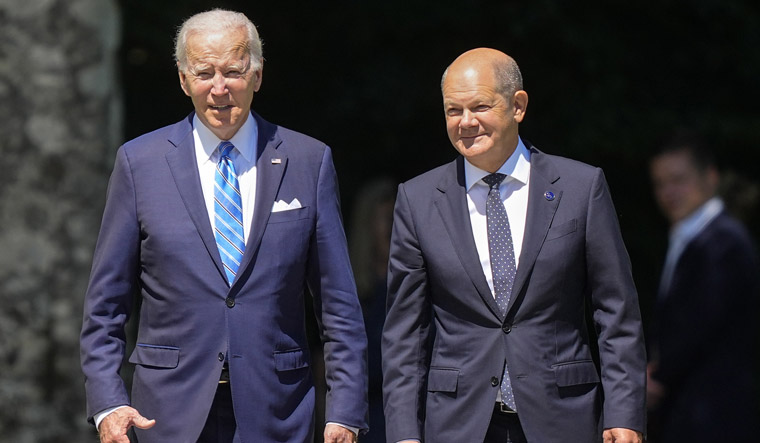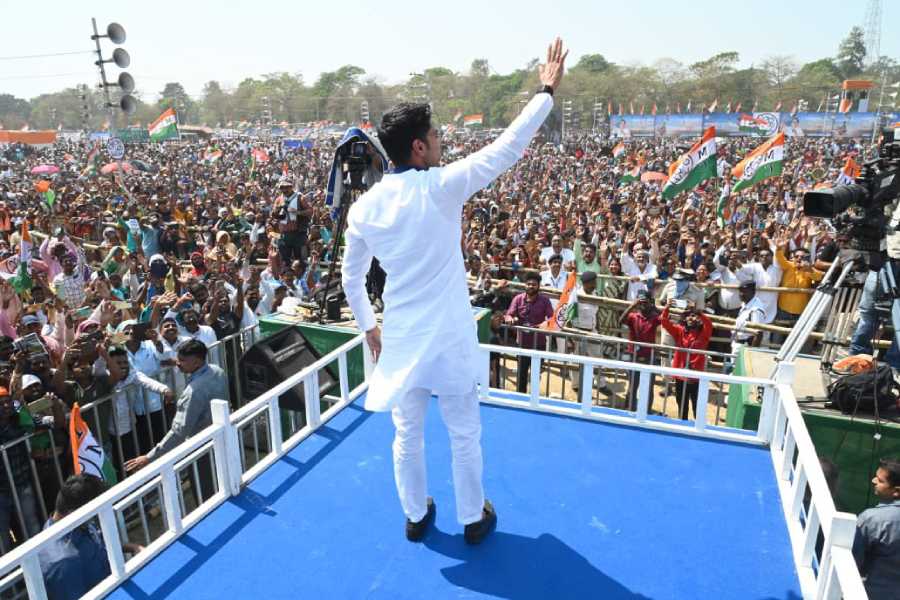FILE - German Chancellor Olaf Scholz, right, and U.S. President Joe Biden, arrive for the official G7 summit welcome ceremony at Castle Elmau in Kruen, near Garmisch-Partenkirchen, Germany, June 26, 2022. Scholz will visit the White House on Friday, March 3, 2023, for a private meeting with Biden. (AP Photo/Martin Meissner, File)
The judicial order on Rahul Gandhi, as pronounced by the court, awarding the maximum punishment of two years, automatically deprived him of his parliamentary seat, disqualifying him from the elected post. The parliament secretariat confirmed his disqualification, which was a mere formality. That is the stated position of the law at present.
What is happening as the Congress and the opposition parties’ reactions unfold in India is not surprising: protests, marches, etc. What is a surprising turn of events is the U.S. State Department’s official statement that the United States is watching the court case of Congress party leader Rahul Gandhi, adding that the country is engaging with India on a “shared commitment to democratic values—including, of course, freedom of expression.”
Germany too followed, with their foreign ministry spokesperson saying that it has taken note of the case and “expects that the standards of judicial independence and fundamental democratic principles will apply.”
Concerted disruptions at Indian embassies and consulates in many parts of the world by anti-India, Khalistani forces, who desecrated temples and vandalised the Indian missions in the UK, Washington, Toronto, and several Australian cities. The flagbearers of democracy watched from the backstage as mute spectators, disregarding their basic responsibility under the Vienna Convention to provide security to diplomatic personnel and property. Only when India retaliated by withdrawing security from the UK High Commission did the English scramble and ensure that they offered protection to Indian interests, which otherwise was their primary and basic responsibility.
The US must stop thinking that it is a better practitioner of democracy than India, where simple disputes are resolved by guns and killings. Wins and losses are taken in stride by the Indian political parties, unlike the ‘invasion’ of Capitol Hill by gangsters captained by the losing candidate, their former president Donald Trump. On the contrary, when Indira Gandhi was unseated by the court, the change of guard was swift and mature, unlike anything seen anywhere in the world, including the US.
The extent of Germany’s influence on elected governments can be read in articles by Gustav Gressel and Majda Ruge. Verbatim, I quote from one of their articles: Some of the (German) MPs exposed had been taking financial payments from authoritarian regimes such as Azerbaijan and North Macedonia to lobby for them in both Berlin and Brussels. But, beyond revealing a shocking propensity for corruption by elected officials—which has been the principal recent focus of the German media—the affairs raise broader questions about authoritarian endeavours to exert influence in German and European politics.
Rahul’s disqualification is his fault, as he tore the ordinance giving protection to parliamentarians three months respite from effecting court orders on disqualification. His government (UPA) quietly withdrew it on 3/10/2013. His disqualification is because of a court order. How would the US or German governments wish to label India: a banana republic? our courts: undemocratic and vengeful towards political opposition? Both countries are known for supporting autocratic regimes for long, with their own economic interests the deciding factors. The reasons for their despair against India could be different: they are unable to tame Modi and are wary of another Asian giant growing as a superpower.
Jai Hind
Sampath Kumar
Intrépide Voix



